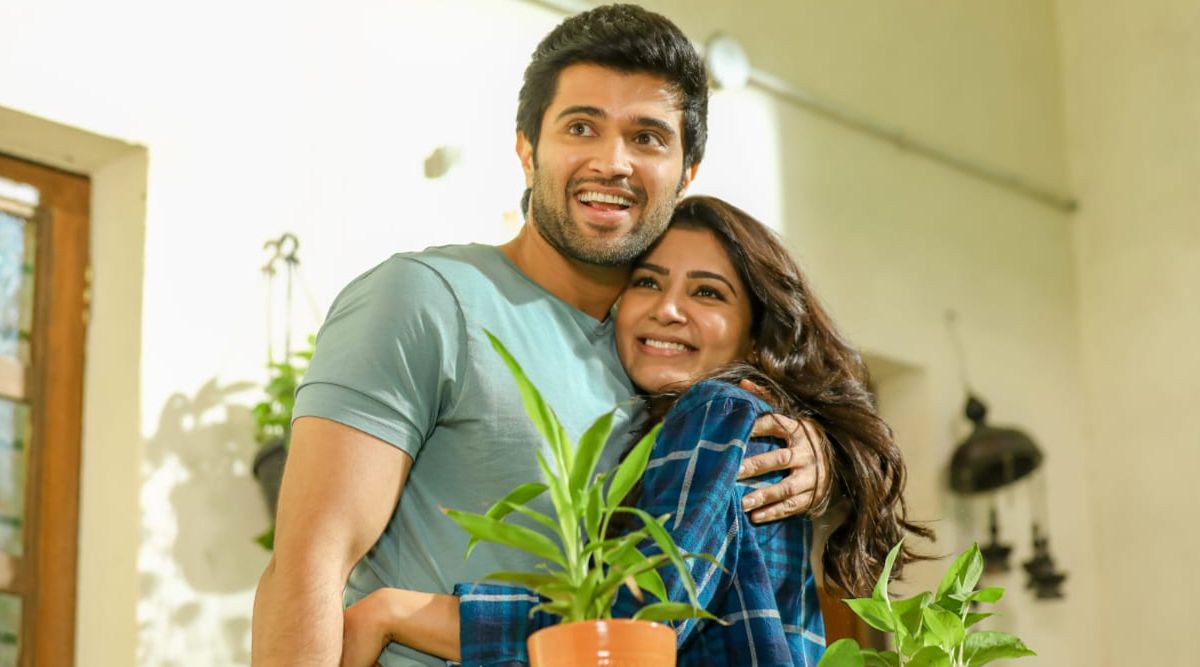Telugu Movie Review: Kushi begins as a lightweight entertainment, ends as a nonsensical drag

The first act of Kushi, while exceedingly absurd even by the standards of a Telugu comedy, is a pretty fun time at the movies. Protagonist Viplav (Vijay Devarakonda) is a complete dork who hasn’t exactly taken after his intellectual father (Sachin Khedekar), a noted professor and public figure widely known for his atheist views. Viplav, a young and hungry telecommunications worker, forgoes a local work assignment that would keep him in his cushy family digs in Hyderabad for a less desirable job near the tumultuous Pakistani border in Kashmir. Naively, he believes this will be a peaceful and idyllic setting to take in the mountain views and pretend he’s the star of a Mani Ratnam movie, with his repeated references to Roja generating several chuckles. When he gets caught up in warzone gunfire immediately upon arrival, it only momentarily kills Viplav’s wide-eyed buzz.
This is all played for exaggerated laughs, of course, as are Viplav’s first interactions with Aaradhya (Samantha Ruth Prabhu), who he initially assumes to be a Muslim woman from Pakistan. On the contrary, she’s a Hindu wearing a headscarf in the Islamic section of Kashmir as she travels to visit the Mamaleshwar Temple… but why would she ever let the instantly smitten puppy-dog Viplav know that she’s a potentially qualified match for him? Alas, Aaradhya’s attempts to tell white lies to ward off Viplav – namely, that she’s in town to find her orphaned younger brother Feroz – backfire when she underestimates him. A few days and an entertainingly ludicrous bike chase later, he’s brought her every boy named Feroz within a fifty-mile radius. The tone is not unlike that of the recent rom-coms McG has produced for Netflix.
We know where this is all going. Despite her initial attempts to resist him, the gorgeous Aaradhya falls for the endearing Viplav as they leave Kashmir. But there’s another big hiccup. We learn that her father is Srinivasa Rao (Murali Sharma), an orthodox religious leader who has previously debated Viplav’s dad on television. Even though this is a predictable direction for the story to go in, it’s mostly welcome because leads Vijay Deverakonda and Samantha have really strong chemistry together. While neither character is particularly irresistible on their own – he’s a buffoon and she’s a little sparse – they really do work perfectly together. It’s hard not to find Viplav’s undying affection for Aaradhya, and her ultimate inability to resist him, to be completely infectious as it develops. This makes the somewhat expected second-act sequences that follow – the families clashing upon their initial meeting, the montage of the couple moving in together and falling deeper and deeper in love – more pleasurable than they deserve to be.
But all big-screen love affairs inevitably reach a period of tumult, and this is where Kushi unfortunately really doesn’t work. For a movie that’s very entertaining in its first act and tolerable at the beginning of its second, it sure crashes and burns later on. As Viplav and Aaradhya begin to face challenges in their young marriage, beyond just their parents’ disagreements, the script seemingly forgets who these characters are. While we expect the focal couple of a rom-com to fall temporarily out of love for a period to up the stakes, this strife has to ring true to both partners in the relationship. But Viplav and Aaradhya’s reactions to a devastating piece of personal news seem so inconsistent with the characters we’ve grown invested in, it takes the viewer completely out of the movie, which never recovers. In particular, Viplav becomes a totally irredeemable asshole – both to Aaradhya and others – to such a degree that I found myself actively rooting against the couple mending fences in the end.
Granted, part of the reason why these plot and character developments feel like they come out of left-field may be that the movie doesn’t lay adequate groundwork for them earlier on. It’s too busy being enjoyably zany and lighthearted in the Kashmir section to build out the characters’ histories. Specifically, we don’t get much background on their respective attitudes towards religion, compared to those of their families. We know that Viplav’s mother is devoutly religious despite her father’s staunch atheism, and that Viplav himself seems to side with his father, but we don’t get much about his views beyond that. We know that Aaradhya is enough of a believer to make a pilgrimage to a Hindu temple in an effort to cure her grandmother’s knee pain, but very little more. In both cases, it really doesn’t seem like either partner feels strongly enough about religion to worry about its impact on their marriage before tying the knot, removed from their family’s approval. But then the conflicts that arise between them, when life throws them curveballs, seem to suggest otherwise. The script doesn’t earn this subtext at all.
Damaged by its leads’ inauthenticity and Viplav’s unlikability in the back half, Kushi sputters to a climax and conclusion that I suspect most audience members will be very anxious to get over with. Of course, given the movie’s 165-minute running time, it takes quite a while to reach the finish line, when we’re showered in all of the expected affirmational themes on family and religion. It’s no help that the big musical number of the second half, “Osi Pellama,” only exacerbates the issues with Viplav’s character, failing to offer a welcome distraction from his unpleasantness. (That said, the title song, which comes early in the movie, gets a very memorable and visually stunning number.) As viewers fidgeting through the third act, we can simply pine for the better film we were watching not two hours earlier.

